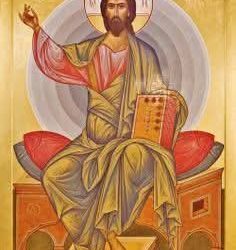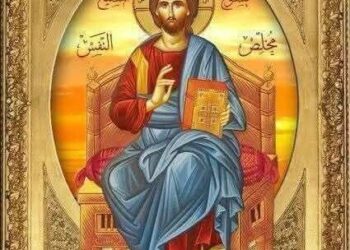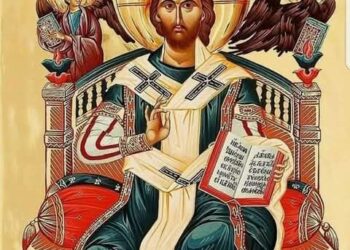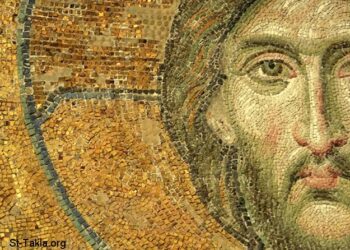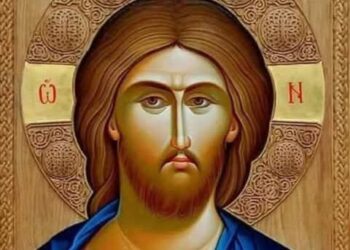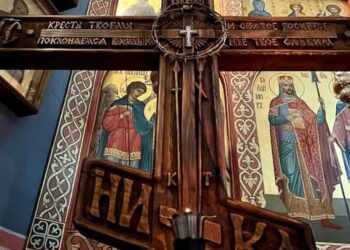- الصفحة الرئيسية
- القداس والقراءات
- زمن الميلاد – القداس الماروني
- زمن الدنح – القداس الماروني
- زمن الصوم – القداس الماروني
- زمن القيامة – القداس الماروني
- زمن العنصرة – القداس الماروني
- زمن الصليب – القداس الماروني
- أعياد ومناسبات – القداس الماروني
- أعياد + نافور شرر – القداس الماروني
- نوافير القداس – طقس ماروني
- الرتب الطقسية – طقس ماروني
- الروزنامة الروحية 2024-2025
- المفكرة الليتورجية المارونية 2024-2025
- تراتيل زمن الميلاد – طقس ماروني
- الصلوات الطقسية
- صلوات زمن الميلاد – طقس ماروني
- صلوات زمن الدنح – طقس ماروني
- صلوات زمن الصوم – طقس ماروني
- صلوات زمن الالام – طقس ماروني
- صلوات زمن القيامة – طقس ماروني
- صلوات زمن العنصرة – طقس ماروني
- صلوات زمن الصليب – طقس ماروني
- صلوات أعياد ومناسبات – طقس ماروني
- الرتب الطقسية – طقس ماروني
- رتب وصلوات وتبريكات خاصة بالكهنة
- تساعية الميلاد – 15 كانون الأول
- تراتيل زمن الميلاد – طقس ماروني
- درب وزياح الصليب
- رُتبة سر مَسْحَة المرضى البسيطة – طقس ماروني
- الإنجيل الأسبوعي
- الإنجيل الأسبوعي – زمن الميلاد – طقس ماروني
- الإنجيل الأسبوعي – زمن الدنح – طقس ماروني
- الإنجيل الأسبوعي – زمن الصوم – طقس ماروني
- الإنجيل الأسبوعي – زمن القيامة – طقس ماروني
- الإنجيل الأسبوعي – زمن العنصرة – طقس ماروني
- الإنجيل الأسبوعي – زمن الصليب – طقس ماروني
- الإنجيل الأسبوعي – الأعياد الثابتة – طقس ماروني
- قديس اليوم
- معرض الفيديو
- وثائق
- Donation
- PayPal
- اتصل بنا
- الصفحة الرئيسية
- القداس والقراءات
- زمن الميلاد – القداس الماروني
- زمن الدنح – القداس الماروني
- زمن الصوم – القداس الماروني
- زمن القيامة – القداس الماروني
- زمن العنصرة – القداس الماروني
- زمن الصليب – القداس الماروني
- أعياد ومناسبات – القداس الماروني
- أعياد + نافور شرر – القداس الماروني
- نوافير القداس – طقس ماروني
- الرتب الطقسية – طقس ماروني
- الروزنامة الروحية 2024-2025
- المفكرة الليتورجية المارونية 2024-2025
- تراتيل زمن الميلاد – طقس ماروني
- الصلوات الطقسية
- صلوات زمن الميلاد – طقس ماروني
- صلوات زمن الدنح – طقس ماروني
- صلوات زمن الصوم – طقس ماروني
- صلوات زمن الالام – طقس ماروني
- صلوات زمن القيامة – طقس ماروني
- صلوات زمن العنصرة – طقس ماروني
- صلوات زمن الصليب – طقس ماروني
- صلوات أعياد ومناسبات – طقس ماروني
- الرتب الطقسية – طقس ماروني
- رتب وصلوات وتبريكات خاصة بالكهنة
- تساعية الميلاد – 15 كانون الأول
- تراتيل زمن الميلاد – طقس ماروني
- درب وزياح الصليب
- رُتبة سر مَسْحَة المرضى البسيطة – طقس ماروني
- الإنجيل الأسبوعي
- الإنجيل الأسبوعي – زمن الميلاد – طقس ماروني
- الإنجيل الأسبوعي – زمن الدنح – طقس ماروني
- الإنجيل الأسبوعي – زمن الصوم – طقس ماروني
- الإنجيل الأسبوعي – زمن القيامة – طقس ماروني
- الإنجيل الأسبوعي – زمن العنصرة – طقس ماروني
- الإنجيل الأسبوعي – زمن الصليب – طقس ماروني
- الإنجيل الأسبوعي – الأعياد الثابتة – طقس ماروني
- قديس اليوم
- معرض الفيديو
- وثائق
- Donation
- PayPal
- اتصل بنا

لماذا أطلق القديس يوحنا الإنجيلي على يسوع المسيح لقب “الكلمة”؟
A
A
Why did Saint John call Jesus Christ “Logos”? The Greek word “Logos” literally means “word.” But as with many words in greek, “Logos” has also a figurative meaning. Greek philosophers such as Heraclitus and Aristotle, generally viewed the logos as the divine principle that created the world and keeps it into existence. In Greek thought, the Logos is the great mind behind all reason. Philon of Alexandria regarded the Logos as the begotten
المزيد من المنشورات
البحث
No Result
View All Result
الأقسام والتصنيفات
- تعليم مسيحي
- الله الاب
- يسوع المسيح
- يسوع المسيح : ابن الله
- يسوع المسيح : طبيعته والوهيته
- يسوع المسيح : النبوءات وما تكلم عنه الانبياء
- يسوع المسيح : تجسده (ميلاده)
- يسوع المسيح : عماده
- يسوع المسيح : رسالته
- يسوع المسيح : الامه وصلبه وموته على الصليب
- يسوع المسيح : صعوده الى السماء
- يسوع المسيح : قيامته
- يسوع المسيح : ظهوره
- يسوع المسيح : المجيء الثاني
- الروح القدس
- الثالوث الاقدس
- وصايا الله العشر
- اسرار الكنيسة السبعة
- وصايا الكنيسة السبعة
- مواهب الروح القدس السبع
- ثمار الروح القدس
- الفضائل الالهية
- السماء
- المطهر
- الجهنم
- الملائكة
- الشياطين
- الخير
- الشر
- الفضائل
- الرذائل
- السحر والشعوذة
- وثائق ومجامع كنسية
- تعاليم وقوانين الكنيسة الكاثوليكية
- الرسائل البابوية
- الرسائل الراعوية لبطاركة الشرق الكاثوليك
- البطريركية المارونية
- موقف الكنيسة من:
- مقالات تعليمية متنوعة
- الكتاب المقدس
- السنة الطقسية
- ليتورجية: قداسات وصلوات ورتب
- طقس ماروني – كاثوليك
- القداس الماروني
- القداس الماروني – زمن الميلاد
- القداس الماروني – زمن الدنح
- القداس الماروني – زمن الصوم
- القداس الماروني – زمن القيامة
- القداس الماروني – زمن العنصرة
- القداس الماروني – زمن الصليب
- القداس الماروني – أعياد ومناسبات
- القداس الماروني – أعياد + نافور شرر
- القداس الماروني – لغات متعددة
- نوافير القداس الماروني – طقس ماروني
- الصلوات الطقسية – طقس ماروني
- الرتب الطقسية – طقس ماروني
- الانجيل الاسبوعي – القراءات الليتورجية – طقس ماروني
- الإنجيل الأسبوعي – زمن الميلاد – القراءات الليتورجية – طقس ماروني
- الإنجيل الأسبوعي – زمن الدنح – القراءات الليتورجية – طقس ماروني
- الإنجيل الأسبوعي – زمن الصوم – القراءات الليتورجية – طقس ماروني
- الإنجيل الأسبوعي – زمن القيامة – القراءات الليتورجية – طقس ماروني
- الإنجيل الأسبوعي – زمن العنصرة – القراءات الليتورجية – طقس ماروني
- الإنجيل الأسبوعي – زمن الصليب – القراءات الليتورجية – طقس ماروني
- الإنجيل الأسبوعي – الاعياد الثابتة – القراءات الليتورجية – طقس ماروني
- القداس الماروني
- طقس لاتيني – كاثوليك
- طقس بيزنطي – الروم الملكيين – كاثوليك
- طقس سرياني – كاثوليك
- طقس روم – ارثوذكس (بيزنطي)
- الروزنامة – تاريخ الأعياد
- رتب وصلوات وتبريكات خاصة بالكهنة
- طقس ماروني – كاثوليك
- الصلوات والتساعيات والمسابح
- مريم العذراء
- أعياد مريمية
- 1 كانون الثاني: مريم أم الله (الأمومة الالهية)
- 15 كانون الثاني : سيدة الزروع
- ٢٣ كانون الثاني: خطبة مريم للقديس يوسف
- 11 شباط : سيدة لورد
- 25 اذار : عيد البشارة
- ٢٦ نيسان: مريم أم المشورة الصالحة
- 3 أيار : سيدة البحر
- ٨ أيار: مريم وسيطة النعم
- 13 أيار: سيدة فاطيما
- 15 ايار : سيدة الحصاد
- ٢٤ أيار: مريم معونة المسيحيين
- ٣١ أيار: زيارة مريم للقديسة أليصابات
- 16 تموز : سيدة الكرمل
- 1 آب : صوم العذراء
- 15 آب : انتقال العذراء مريم (سيدة الكرم)
- 8 أيلول : ميلاد مريم العذراء (غ)
- 15 أيلول : سيدة الأوجاع
- 7 تشرين الأول : سلطانة الوردية المقدسة
- 21 تشرين الثاني : عيد دخول العذراء إلى الهيكل
- 27 تشرين الثاني : عيد سيّدة الايقونة العجائبيّة
- 8 كانون الأول : الحبل بلا دنس
- أعياد مريمية بوجه العموم
- كتب مريمية
- عقائد مريمية
- ظهورات مريم العذراء
- ظهورات سيدة غوادالوبي في المكسيك 1531
- ظهورات سيدة سيلغوا في ليتوانيا 1608
- ظهورات سيدة لاوس في فرنسا 1664
- ظهورات سيدة الايقونة العجائبية في باريس 1830
- ظهورات العذراء في لاساليت 1846
- ظهورات العذراء في لورد 1858
- ظهورات سيدة بونتمان في فرنسا 1871
- ظهورات سيدة معونة المسيحيين في تشيك 1885
- ظهورات العذراء في فاطيما 1917
- مقالات مريمية
- فضائل مريمية
- قصائد مريمية
- تراتيل مريمية – تاريخها
- اقوال قديسين عن مريم العذراء
- ايقونات مريمية – شرح وتفسير
- أعياد مريمية
- الحياة المكرسة والنذور الرهبانية
- مكتبة روحية
- مقالات اباء الكنيسة
- مقالات : اكليمنضوس الاسكندري
- مقالات : اثناسيوس
- مقالات : امبروسيوس
- مقالات : اغوسطينوس
- مقالات : افرام السرياني
- مقالات : باسيليوس الكبير
- مقالات : نيوفان الحبيس
- مقالات : غريغوريوس النيصي
- مقالات : غريغوريوس بالاماس
- مقالات : غريغوريوس النزينزي اللاهوتي – الناطق بالالهيات
- مقالات : كيرلس السكندري
- مقالات : كيرلس الاورشليمي
- مقالات : يوحنا كاسيان
- مقالات : يوحنا الدمشقي
- مقالات : يوحنا فم الذهب
- مقالات : القديس فيلوكسينوس
- مقالات واقوال اباء الكنيسة متفرقة
- كتب اباء الكنيسة
- كتب : افرام السرياني
- كتب : اتناسوس
- كتب : امبروسوس
- كتب اغوسطينوس
- كتب : اكليمنضوس الروماني
- كتب : اكليمنضوس الاسكندري
- كتب : باسيليوس الكبير
- كتب : غريغوريس النيصي
- كتب : غريغوريوس النزينزي اللاهوتي – الناطق بالالهيات
- كتب : كيرلس الاورشليمي
- كتب : مقاريوس الكبير
- كتب : كبريانوس
- كتب : يوحنا كاسيان
- كتب : يوحنا فم الذهب
- كتب : يوستينوس الشهيد
- كتب روحية متفرقة
- كتب روحية منسقة
- سير قديسين – السنكسار
- أعياد ومناسبات
- كانون الثاني – أعياد ومناسبات
- شباط – أعياد ومناسبات
- آذار – أعياد ومناسبات
- نيسان – أعياد ومناسبات
- أيار – أعياد ومناسبات
- حزيران – أعياد ومناسبات
- تموز – أعياد ومناسبات
- 6 تموز : القديسة ماريا غورتي
- 9 تموز : القديسة فيرونيكا جولياني
- 10 تموز :القديسون الاخوة المسابكييون والرهبان الفرنسيسكان وشهداء دمشق ١٨٦٠
- الاحد الثالث من تموز : عيد القديس شربل
- 17 تموز : القديسة مارينا وادي قنوبين
- 20 تموز : مار الياس الحي
- 22 تموز : مريم المجدلية
- 22 تموز : مار نوهرا
- 25 تموز : عيد القدبسة حنة
- 31 تموز : تلاميذ مار مارون 350 شهيد
- آب – أعياد ومناسبات
- أيلول – أعياد ومناسبات
- تشرين الأول – أعياد ومناسبات
- تشرين الثاني – أعياد ومناسبات
- كانون الأول – أعياد ومناسبات
- تاريخ الكنيسة
- الكنائس وتاريخها
- الفن الكنسي
- تاريخ الايقونة
- الايقونة وشرحها
- جنود مريم – منشورات
- يسوع المسيح – جنود مريم
- مريم العذراء – جنود مريم
- قديسين – جنود مريم
- قديسات – جنود مريم
- ملائكة – جنود مريم
- كتب وصلوات روحية وتعليم – جنود مريم
- شهر مع أصدقائنا الأنفس المطهريّة – جنود مريم
- سر الرحمة الالهية – صلوات للرحمة الالهية – جنود مريم
- الصلاة الارادة الالهية – جنود مريم
- سر السعادة – الصلوات الخمس عشرة المُلهمة من سيّدنا يسوع المسيح للقدّيسة بريجيتا – جنود مريم
- القداس الالهي – اسرار تكشفها العذراء – جنود مريم
- العيش في ملكوت المشيئة الإلهية – جنود مريم
- اسرار الكنيسة السبعة – جنود مريم
- منشورات وصلوات روحية وتعليم – جنود مريم
- كتب متفرقة وارشارد – جنود مريم
- منشورات متفرقة وارشاد – جنود مريم
- عائلة قلب يسوع الاقدس – سوريا
- مقالات متفرقة
- اعلانات مناسبات أحداث
- مقالات اباء الكنيسة
- مواضيع وقصص
- تربوي وثقافي وصحة
- مواقع WEBLINKS
- تراتيل MP3
- زمن الميلاد المجيد – mp3
- Christmas Noel – mp3
- زمن الدنح – عماد يسوع – mp3
- زمن الصوم – mp3
- درب الصليب
- اسبوع الالام – mp3
- زمن القيامة – mp3
- زمن العنصرة – mp3
- عبادة قلب يسوع الأقدس – mp3
- مريم العذراء – mp3
- المسبحة الوردية – لغات متعددة – mp3
- مزامير – mp3
- تراتيل مارونية – mp3
- تراتيل كلدانية – mp3
- تراتيل بيزنطية – روم كاثوليك – mp3
- تراتيل بيزنطية – روم أورثوذكس – mp3
- تراتيل أرمن ارثوذكس – mp3
- تراتيل قديسون – mp3
- تراتيل قديسات – mp3
- مكرسون – mp3
- فنانين: جومانا، ماجدة … mp3
- جوقات mp3 – Coral
- القربانة الاولى – mp3
- صلوات – mp3
- قصائد – mp3
- mp3 – Gregorian
- Music: Bach, Mozart … mp3
- موسيقى – mp3
- اغاني اطفال – عربي، فرنسي، انكليزي – mp3
- slider





